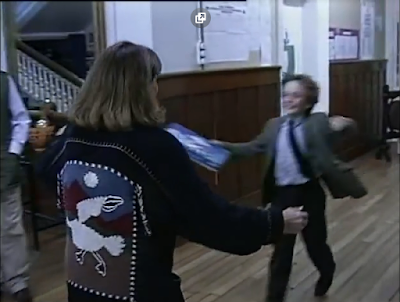The documentary itself is relatively gentle with its subject, if we're considering the subject as the school as well as the boys who it films there. (Viewers may not feel the same way.) This is not something that can be said of the book which recommended it, Alex Renton's Stiff Upper Lip, a genuinely angry, excoriating and most of all well-informed attack on the practice, almost unique to Britain, of sending children in large numbers to boarding schools.
Renton's work is a litany of physical, sexual and psychological abuse of boys by other boys, boys by older boys and boys by adults, and if it is uncomfortable reading, that is not a great deal of suffering compared to what it describes. This isn't something you see in The Making of Them and viewers have to locate their own signals to tell them about the happiness, or otherwise, of the stranded boys.
Which leads me on to the image, or rather the sequence, that interested me. It's worth watching the whole documentary, of course, but what caught my eye occurs just after 31 minutes.
It's the first visiting weekend of the term, and Mum and Dad have come to see their son. He runs towards his mother
and they hug. And what's that he's got?
It's a chess set (I think I recall the design - we must have used them at any number of tournaments).
Anyway the lad sees someone, or something, and disappears for a minute, leaving Mum with the chess set
which she holds while talking to Dad as they wait for their boy to come back.
I don't want to draw any particular conclusions from this sequence - I'm not in a position to. I just found it a little moving, partly of course because chess played a role in my childhood too (though my school experience was a very different one) but partly because the sequence - the boy clutching his mother and the chess set, and then his mother clutching just the set - is an affecting one, whatever it meant in real life and however you choose to interpret it.
And of course, you wonder who the boy was, and because you are a chess player you wonder, does he still play? But most of all you hope that chess was good to him, and that it gave him a friend when maybe he needed one. Perhaps in that respect the boy's experience might not be so very different to ours.







2 comments:
After reaching a certain age, I've been able to shake the idea that the public school boarding system was just a few inches short of institutional child abuse. My initial images of it were probably primarily formed from Dahl's narratives, although a whole host of other literature and film must have added their impressions. With the passing years each of those becomes more negative. Does this transition towards the status of an orphan have any parallel with Chess? Today some like to promote the value of Chess in Education. Now is their chance to speak. (Ahem)
--theBlueWeasel--rememberingthetimetheschoolchesscoach(pinky)suggestedthathegoonholidaywithhim
Talking of which this came up over the weekend.
(I should stress that while reading about abuse was the starting point by which I arrived at The Making of Them, it has nothing to do with the film, or the sequence I'm talking about. I just found the images touching.)
Post a Comment